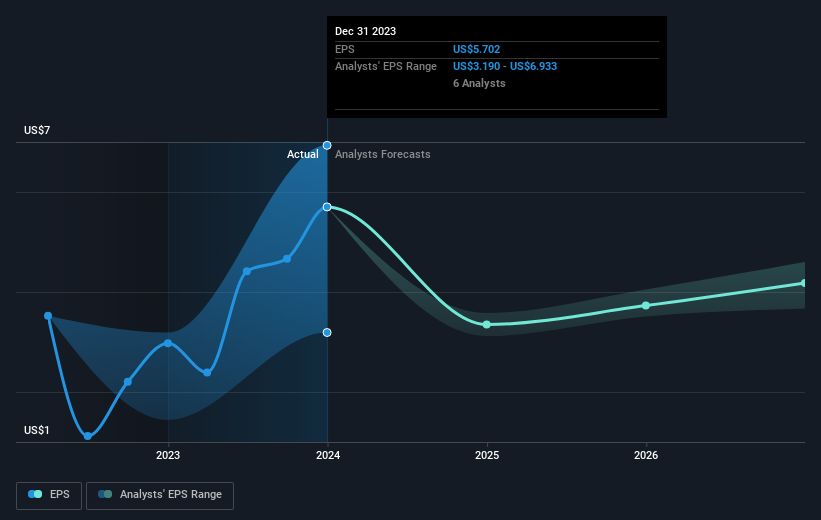Stock Analysis
- Canada
- /
- Professional Services
- /
- TSX:TRI
Thomson Reuters (TSE:TRI) shareholders have earned a 23% CAGR over the last five years

When you buy a stock there is always a possibility that it could drop 100%. But when you pick a company that is really flourishing, you can make more than 100%. Long term Thomson Reuters Corporation (TSE:TRI) shareholders would be well aware of this, since the stock is up 146% in five years. Meanwhile the share price is 2.1% higher than it was a week ago.
So let's assess the underlying fundamentals over the last 5 years and see if they've moved in lock-step with shareholder returns.
See our latest analysis for Thomson Reuters
There is no denying that markets are sometimes efficient, but prices do not always reflect underlying business performance. One flawed but reasonable way to assess how sentiment around a company has changed is to compare the earnings per share (EPS) with the share price.
Over half a decade, Thomson Reuters managed to grow its earnings per share at 121% a year. The EPS growth is more impressive than the yearly share price gain of 20% over the same period. Therefore, it seems the market has become relatively pessimistic about the company.
The image below shows how EPS has tracked over time (if you click on the image you can see greater detail).

It is of course excellent to see how Thomson Reuters has grown profits over the years, but the future is more important for shareholders. You can see how its balance sheet has strengthened (or weakened) over time in this free interactive graphic.
What About Dividends?
It is important to consider the total shareholder return, as well as the share price return, for any given stock. The TSR is a return calculation that accounts for the value of cash dividends (assuming that any dividend received was reinvested) and the calculated value of any discounted capital raisings and spin-offs. It's fair to say that the TSR gives a more complete picture for stocks that pay a dividend. We note that for Thomson Reuters the TSR over the last 5 years was 179%, which is better than the share price return mentioned above. This is largely a result of its dividend payments!
A Different Perspective
It's good to see that Thomson Reuters has rewarded shareholders with a total shareholder return of 20% in the last twelve months. And that does include the dividend. However, the TSR over five years, coming in at 23% per year, is even more impressive. While it is well worth considering the different impacts that market conditions can have on the share price, there are other factors that are even more important. Even so, be aware that Thomson Reuters is showing 2 warning signs in our investment analysis , and 1 of those can't be ignored...
We will like Thomson Reuters better if we see some big insider buys. While we wait, check out this free list of growing companies with considerable, recent, insider buying.
Please note, the market returns quoted in this article reflect the market weighted average returns of stocks that currently trade on Canadian exchanges.
Valuation is complex, but we're helping make it simple.
Find out whether Thomson Reuters is potentially over or undervalued by checking out our comprehensive analysis, which includes fair value estimates, risks and warnings, dividends, insider transactions and financial health.
View the Free AnalysisHave feedback on this article? Concerned about the content? Get in touch with us directly. Alternatively, email editorial-team (at) simplywallst.com.
This article by Simply Wall St is general in nature. We provide commentary based on historical data and analyst forecasts only using an unbiased methodology and our articles are not intended to be financial advice. It does not constitute a recommendation to buy or sell any stock, and does not take account of your objectives, or your financial situation. We aim to bring you long-term focused analysis driven by fundamental data. Note that our analysis may not factor in the latest price-sensitive company announcements or qualitative material. Simply Wall St has no position in any stocks mentioned.
About TSX:TRI
Thomson Reuters
Thomson Reuters Corporation engages in the provision of business information services in the Americas, Europe, the Middle East, Africa, and the Asia Pacific.
Outstanding track record with adequate balance sheet.

